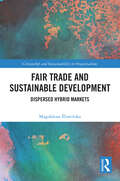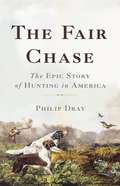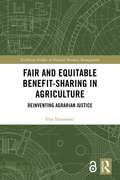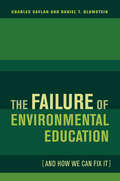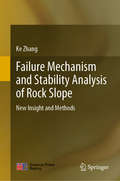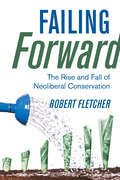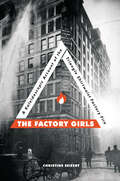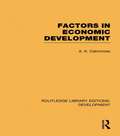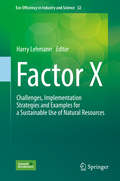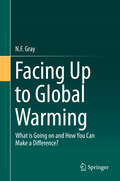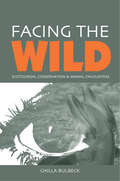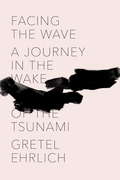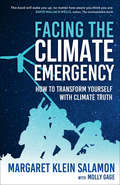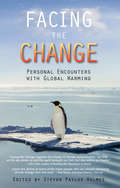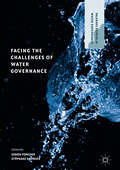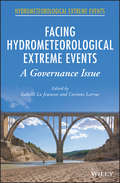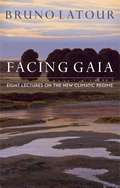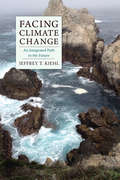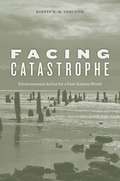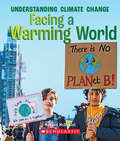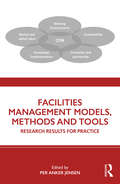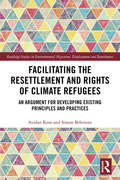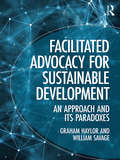- Table View
- List View
Fair Trade and Sustainable Development: Dispersed Hybrid Markets (Citizenship and Sustainability in Organizations)
by Magdalena ŚliwińskaFair Trade constitutes a social-business initiative that plays a crucial role in the transition towards a "sustainable market economy", countering the major challenges of the 21st century. This research monograph reveals the mechanisms behind this process. It argues that Fair Trade constitutes a new type of market, "a Dispersed Hybrid Market (DHM)", that due to its specific features contributes to a more pro-social functioning of the entire market and taking responsibility for sustainable development by different market participants. It demonstrates, thus, what was underestimated about Fair Trade, and which is extremely important, that it can have a positive impact on the market in terms of sustainable transformation. The book is intended for researchers, lecturers, students, practitioners, and political decision-makers interested in sustainable development, Fair Trade, and transition towards sustainable markets, business, and economy. It contributes to better understanding of sustainability challenges explaining specifics of Fair Trade market, revealing paradoxes and barriers of its development and showing mechanisms of its spillover effects. It also develops arguments about the need to change the role of the state in the face of global challenges and to support such grassroots international initiatives as Fair Trade. Therefore the practical recommendations address both the desired directions of development of the self-governance of this initiative and the expected role of the state towards it, in particular possible ways to strengthen it.
The Fair Chase: The Epic Story of Hunting in America
by Philip DrayAn award-winning historian tells the story of hunting in America, showing how this sport has shaped our national identity.From Daniel Boone to Teddy Roosevelt, hunting is one of America's most sacred-but also most fraught-traditions. It was promoted in the 19th century as a way to reconnect "soft" urban Americans with nature and to the legacy of the country's pathfinding heroes. Fair chase, a hunting code of ethics emphasizing fairness, rugged independence, and restraint towards wildlife, emerged as a worldview and gave birth to the conservation movement. But the sport's popularity also caused class, ethnic, and racial divisions, and stirred debate about the treatment of Native Americans and the role of hunting in preparing young men for war. This sweeping and balanced book offers a definitive account of hunting in America. It is essential reading for anyone interested in the evolution of our nation's foundational myths.
Fair and Equitable Benefit-Sharing in Agriculture: Reinventing Agrarian Justice (Earthscan Studies in Natural Resource Management)
by Elsa TsioumaniThis book explores the emergence and development of the legal concept of fair and equitable benefit-sharing, and its application in agriculture. Developed in the 1990s, the concept of fair and equitable benefit-sharing has been deployed in an ever-wider variety of international instruments, including those on biodiversity, climate change, and human rights. A lack of clarity persists however on what fair and equitable benefit-sharing requires and entails, and whether its implementation supports or eventually undermines equity and justice. This book examines these questions in the area of land, food and agriculture, addressing, for the first time, several instances of the agricultural production chain, including research and development, land governance and land use, and access to markets. It identifies challenges regarding implementation of the concept as enshrined in environmental treaties and soft-law instruments, with a focus on the International Treaty on Plant Genetic Resources for Food and Agriculture, the Voluntary Guidelines on Tenure and the UN Declaration on the Rights of Peasants. It investigates its role, enabling conditions and limitations, in a contradictory policy context involving environmental, food security and human rights objectives but also a growing web of multilateral and bilateral trade and investment agreements. Linking international law research with a socio-legal analysis, the book addresses four grassroots examples, which offer ideas for institutional and legal innovation from the local to the global level. This interdisciplinary title will be of great interest to students and scholars of international environmental law, agriculture, land law, development studies and international governance, as well as policymakers and practitioners working in these fields.
The Failure of Environmental Education (And How We Can Fix It)
by Charles Saylan Daniel T. BlumsteinAt a time when wild places everywhere are vanishing before our eyes, Charles Saylan and Daniel T. Blumstein offer this passionate indictment of environmental education--along with a new vision for the future. Writing for general readers and educators alike, Saylan and Blumstein boldly argue that education today has failed to reach its potential in fighting climate change, biodiversity loss, and environmental degradation. In this forward-looking book, they assess the current political climate, including the No Child Left Behind Act, a disaster for environmental education, and discuss how education can stimulate action--including decreasing consumption and demand, developing sustainable food and energy sources, and addressing poverty. Their multidisciplinary perspective encompasses such approaches as school gardens, using school buildings as teaching tools, and the greening of schoolyards. Arguing for a paradigm shift in the way we view education as a whole, The Failure of Environmental Education demonstrates how our education system can create new levels of awareness and work toward a sustainable future.
Failure Mechanism and Stability Analysis of Rock Slope: New Insight and Methods
by Ke ZhangThis book presents in-depth coverage of laboratory experiments, theories, modeling techniques, and practices for the analysis and design of rock slopes in complex geological settings. It addresses new concepts in connection with the kinematical element method, discontinuity kinematical element method, integrated karst cave stochastic model-limit equilibrium method, improved strength reduction method, and fracture mechanics method, taking into account the relevant geological features. The book is chiefly intended as a reference guide for geotechnical engineering and engineering geology professionals, and as a textbook for related graduate courses.
Failing Forward: The Rise and Fall of Neoliberal Conservation
by Robert FletcherFailing Forward documents the global rise of neoliberal conservation as a response to biodiversity loss and unpacks how this approach has managed to "fail forward" over time despite its ineffectiveness. At its core, neoliberal conservation promotes market-based instruments intended to reconcile environmental preservation and economic development by harnessing preservation itself as the source of both conservation finance and capital accumulation more generally. Robert Fletcher describes how this project has developed over the past several decades along with the expanding network of organizations and actors that have come together around its promotion. Drawing on Lacanian psychoanalysis, he explores why this strategy continues to captivate states, nongovernmental organizations, international financial institutions, and the private sector alike despite its significant deficiencies. Ultimately, Fletcher contends, neoliberal conservation should be understood as a failed attempt to render global capitalism sustainable in the face of its intensifying social and ecological contradictions. Consequently, the only viable alternative capable of simultaneously achieving both environmental sustainability and social equity is a concerted program of "degrowth" grounded in post-capitalist principles.
The Factory Girls: A Kaleidoscopic Account of the Triangle Shirtwaist Factory Fire
by Christine SeifertThe twentieth century ushered in a new world filled with a dazzling array of consumer goods. Even the poorest immigrant girls could afford a blouse or two. But these same immigrant teens toiled away in factories in appalling working conditions. Their hard work and sacrifice lined the pockets of greedy factory owners who were almost exclusively white men. The tragic Triangle Waist Factory fire in 1911 resulted in the deaths of over a hundred young people, mostly immigrant girls, who were locked in the factory. Told from the perspective of six young women who lived the story, this book reminds us why what we buy and how we vote really matter.
Factors in Economic Development (Routledge Library Editions: Development)
by A. K. CairncrossFirst published in 1961, this work is a compendium of essays written by esteemed economist Sir Alexander Cairncross, pertaining to the theme of economic development. A wide cross-section of factors are taken into account in this extensive collection of articles, amongst which are the importance of investment and technical progress; trade; administration and planning; and the role of education.
Factor X
by Harry LehmannFactor X: Re-source Designing the Recycling Society explores the role of recycling in efforts to achieve the sustainable world envisioned in the Federal Environment Ministry s Resource Efficiency Programme, known as ProgRess. The chapters build a roadmap to a Recycling Society in which the decoupling of resource consumption and economic growth is accomplished. "
Facing Up to Global Warming
by N. F. GrayIn this volume, Professor N. F. Gray offers a comprehensive primer on climate change, sustainability, and how the two concepts are related. This book consists of fifteen chapters, each treating a specific aspect of the current global crisis, including scientific background as well as an up to date appraisal of the issue at hand. It covers the reasons behind climate change and the effect it will have on the planet and on the reader directly. Gray also presents readers with the means to assess their own environmental impact and details positive individual and community actions to address global warming. "Climate change," "global warming," and "sustainability" are phrases that almost everyone has heard, whether on the news or around the dinner table. The increasing frequency of major events such as droughts, severe storms, and floods are beginning to make these concepts inescapable, and being fully informed is an absolute necessity for students and indeed for us all. Nick Gray (PhD, ScD) is a founding member of the Environmental Sciences Unit (1979) at Trinity College Dublin, which was the first center for postgraduate research and training in environmental science and technology in Ireland. He has written a number of books and over 150 research papers and book chapters, and currently serves as the Director of the Trinity Centre for the Environment.
Facing the Wild: Ecotourism, Conservation and Animal Encounters
by Chilla BulbeckWhat do wild animals mean to humans? Will they survive both rampant habitat loss and extinction caused by human encroachment and, as ecotourists, our enthusiasm for them? With ecotourism now the fastest growing segment of tourism, and encounters with wild animals - be it swimming with dolphins, going on safari or bird watching - ever more popular, these are critical questions. Yet until now little has been known about why people crave encounters with wild animals and the meaning for the ecotourism industry, conservation efforts and society at large. Facing the Wild is the first serious empirical examination of why people seek out animals in their natural environment, what the desire for this experience tells us about the meanings of animals, nature, authenticity and wilderness in contemporary industrialized societies, and whether visitors change their environmental perspectives and behaviour, as the custodians of wildlife parks would like them to. The book explores the contradictions and ambivalence that so many people experience in the presence of 'wild nature' - in loving it we may diminish it and in the act of wanting to see it we may destroy it. Ultimately the book makes a case for 'respectful stewardship' of a 'hybrid nature' and provides insight for both practitioners and ecotourists alike.
Facing the Wave: A Journey in the Wake of the Tsunami
by Gretel EhrlichA passionate student of Japanese poetry, theater, and art for much of her life, Gretel Ehrlich felt compelled to return to the earthquake-and-tsunami-devastated Tohoku coast to bear witness, listen to survivors, and experience their terror and exhilaration in villages and towns where all shelter and hope seemed lost. In an eloquent narrative that blends strong reportage, poetic observation, and deeply felt reflection, she takes us into the upside-down world of northeastern Japan, where nothing is certain and where the boundaries between living and dying have been erased by water. The stories of rice farmers, monks, and wanderers; of fishermen who drove their boats up the steep wall of the wave; and of an eighty-four-year-old geisha who survived the tsunami to hand down a song that only she still remembered are both harrowing and inspirational. Facing death, facing life, and coming to terms with impermanence are equally compelling in a landscape of surreal desolation, as the ghostly specter of Fukushima Daiichi, the nuclear power complex, spews radiation into the ocean and air. Facing the Wave is a testament to the buoyancy, spirit, humor, and strong-mindedness of those who must find their way in a suddenly shattered world.
Facing the Climate Emergency: How to Transform Yourself with Climate Truth
by Molly Gage Margaret Klein SalamonStop fretting and start fighting global warming: “A remarkable account of how you can become a climate warrior.” —Bill McKibben, founder of 350.orgYes, we’re facing catastrophic breakdown of our climate. Yes, it’s terrifying. But you don’t have to be paralyzed. You can use your pain to transform yourself, your friends, and the world. You can become the hero humanity needs. This book will show you how.Facing the Climate Emergency is an action-oriented self-help guide showing you how to maximize your potential to meet the greatest challenge humanity has ever faced. Written for all of us struggling to cope and wanting to do something to stop the climate crisis, it gives us the blueprint to leave “normal” behind and enter climate “emergency mode.”How to face the climate crisis and accept your fears, anger, grief, guilt, and other emotionsTurning negative feelings into tangible action to respond to the crisisRising to heroism and maximizing your impact by joining the Climate Emergency MovementInformation on further reading, questions for self-reflection, and exercises “This book will wake you up, no matter how aware you think you are.” —David Wallace-Wells, #1 New York Times-bestselling author of The Uninhabitable Earth
Facing the Change
by Steven Pavlos Holmes"Amidst the current deluge of statistics about global warming, this book provides a refreshing look at how individuals are affected. This is a beautiful book to keep near, open at random, and share the words of gifted writers as they prepare for the coming changes."-Publishers Weekly"Holmes, a scholar in environmental humanities, has assembled a rich, varied collection of personal accounts and poems...An artistic and intimate approach to the problem that humanizes our concerns."--Booklist"How do you respond when the familiar, benevolent, and predictable world you count on becomes strange, hostile, and chaotic? First, you must face it. Next, bear witness. Steven Holmes has gathered compelling testimonies about the ways our earthly home is changing in the short space of our own lifetimes. They beg us to pay attention and act. We are wise to heed these passionate voices."-Chip Ward, author of Hope's Horizon"These earnest and heartfelt poems, essays, and imaginings change our discourse from data to personal testimony, channeling 'care and concern.' Maybe, just maybe, these authors who call us to 'unheroic' action 'on life's behalf' will steer us away from tragedy and chaos. 'Emerging from denial is like moving from blindness to light.' As the refrain from one writer puts it, 'Good Lord! Good luck!'"-Stephen Trimble, author of Bargaining for Eden: The Fight for the Last Open Spaces in America"Facing the Change shares the stories of some of the many people in the US and the world who are already witnessing climate change here and now. They are giving us early warning signs; it's up to all of us to act now."-Mae Boeve, executive director of 350.org"Facing the Change registers the impact of climate destabilization, not only on the sky above us and the earth beneath our feet, but also within our hearts. The voices in this eloquent and original book convey the dread and grief, the anger, but also the experiences of love and community that are intensified by the defining ecological challenge of our time."-John Elder, author of Reading the Mountains of Home, editor of The Norton Book of Nature"These eloquent stories, essays, and poems by scores of 'emotional and cultural first responders' to the effects of climate change are sure to deliver a powerful wake-up call to anyone who has supposed that nothing an individual person can say or do will affect this impending disaster."-Lawrence Buell, author of The Environmental Imagination"...the contributors to Facing the Change have begun to reveal the experiential heart of a planetary process. This is a truly important project." -Scott Slovic, editor of ISLE: Interdisciplinary Studies in Literature and EnvironmentFilled not with bare facts and dire warnings but with evocative, accessible stories, essays, and poetry, Facing the Change shows how global warming is affecting the everyday lives of people today. A wide range of writers brings courage, honesty, and insight to one of the major issues of our lives.Steven Pavlos Holmes, Ph.D., is an independent scholar in the environmental humanities, with a special interest in people's personal experiences of the natural world. His first book, The Young John Muir: An Environmental Biography, won the Modern Language Association's Prize for Independent Scholars. He lives in Jamaica Plain, Massachusetts.
Facing the Challenges of Water Governance (Palgrave Studies in Water Governance: Policy and Practice)
by Simon Porcher Stéphane SaussierAccess to water is one of the most pressing global issues of the twenty-first century, particularly when set against the background of a rapidly growing global population. This book provides a cutting-edge, comprehensive overview of the challenges facing water governance and regulatory choices. The recently adopted Sustainable Development Goals set forward an ambitious agenda of providing universal access to good quality water supply and sanitation services within a financially constrained environment: however, the various peculiarities of each country regarding water governance makes it difficult to identify and implement the best practices and benchmarks. Drawing together empirical studies from countries around the world, the editors and contributors combine extensive data to review the individual challenges facing each country, from the supervision of autonomous regulatory bodies to the question of centralization and the influence of local utility companies. This pioneering and practical volume will be of interest and value not only to students and scholars of water governance, but also to practitioners and regulators.
Facing Hydrometeorological Extreme Events: A Governance Issue (Hydrometeorological Extreme Events)
by Corinne Larrue Isabelle La JeunesseProvides an understanding of the relationship between social-ecological systems and multilevel governance so that readers can properly deal with hydrometeorological extreme events and hazards Based on field investigations from EU research projects, this book is the first to devote itself to scientific and policy-related knowledge concerning climate change-induced extreme events. It depicts national and international strategies, as well as tools used to improve multilevel governance for the management of hydrometeorological risks. It also demonstrates how these strategies play out over different scales of the decision-making processes. Facing Hydrometeorological Extreme Events: A Governance Issue offers comprehensive coverage of such events as floods, droughts, coastal storms, and wind storms. It showcases real-life success stories of multilevel governance and highlights the individuals involved and the resources mobilized in the decision-making processes. The book starts by presenting a synthesis of hydrometeorological extreme events and their impacts on society. It then demonstrates how societies are organizing themselves to face these extreme events, focusing on the strategies of integration of risk management in governance and public policy. In addition, it includes the results of several EU-funded projects such as CLIMB, STARFLOOD, and INTERREG IVB project DROP. The first book dedicated to hydrometeorological extreme events governance based on field investigations from EU research projects Offers a “multi-hazards” approach—mixing policy, governance, and field investigations’ main outputs Features the results of EU-funded projects addressing hydrometeorological extreme events Part of the Hydrometeorological Extreme Events series Facing Hydrometeorological Extreme Events is an ideal book for upper-graduate students, postgraduates, researchers, scientists, and policy-makers working in the field.
Facing Gaia Eight Lectures on the New Climatic Regime
by Bruno LatourThe emergence of modern sciences in the seventeenth century profoundly renewed our understanding of nature. For the last three centuries new ideas of nature have been continually developed by theology, politics, economics, and science, especially the sciences of the material world.
Facing Climate Change: An Integrated Path to the Future
by Jeffrey KiehlFacing Climate Change explains why people refuse to accept evidence of a warming planet and shows how to move past partisanship to reach a consensus for action. A climate scientist and licensed Jungian analyst, Jeffrey T. Kiehl examines the psychological phenomena that twist our relationship to the natural world and their role in shaping the cultural beliefs that distance us further from nature. He also accounts for the emotions triggered by the lived experience of climate change and the feelings of fear and loss they inspire, which lead us to deny the reality of our warming planet.But it is not too late. By evaluating our way of being, Kiehl unleashes a potential human emotional understanding that can reform our behavior and help protect the Earth. Kiehl dives deep into the human brain's psychological structures and human spirituality's imaginative power, mining promising resources for creating a healthier connection to the environment—and one another. Facing Climate Change is as concerned with repairing our social and political fractures as it is with reestablishing our ties to the world, teaching us to push past partisanship and unite around the shared attributes that are key to our survival. Kiehl encourages policy makers and activists to appeal to our interdependence as a global society, extracting politics from the process and making decisions about our climate future that are substantial and sustaining.
Facing Climate Change: An Integrated Path to the Future
by Jeffrey T. KiehlJeffrey T. Kiehl is a senior scientist at the National Center for Atmospheric Research and a fellow of the American Geophysical Union and the American Meteorological Society. He is a recipient of the AGU Climate Communication Prize. He is also a senior Jungian analyst with the C. G. Jung Institute of Colorado, the Inter-Regional Society of Jungian Analysts, and the International Association for Analytical Psychology.
Facing Climate Change: An Integrated Path to the Future
by Jeffrey T. KiehlFacing Climate Change explains why people refuse to accept evidence of a warming planet and shows how to move past partisanship to reach a consensus for action. A climate scientist and licensed psychotherapist, Jeffrey T. Kiehl examines the psychological phenomena that twist our relationship to the natural world and their role in shaping the cultural beliefs that distance us further from nature. He also accounts for the emotions triggered by the lived experience of climate change and the feelings of fear and loss they inspire, encouraging us to retreat into fantasy.But all is not lost. By evaluating our way of being, Kiehl unleashes a potential human emotional understanding that can reform our behavior and help protect the Earth. Kiehl dives deep into the human brain's psychological structures and human spirituality's imaginative power, mining promising resources for creating a healthier connection to the environment-and each other. Facing Climate Change is as concerned with repairing our social and political fractures as it is with reestablishing our ties to the world, teaching us to push past partisanship and unite around the shared attributes that are key to our survival. Kiehl encourages policymakers and activists to appeal to our vast interdependence as a global society, extracting politics from the process and making decisions about our climate future that are more substantial and sustaining.
Facing Catastrophe: Environmental Action for a Post-Katrina World
by Robert R. VerchickAs Hurricane Katrina vividly revealed, disaster policy in the United States is broken and needs reform. What can we learn from past disasters—storms, floods, earthquakes, tsunamis, landslides, and wildfires—about preparing for and responding to future catastrophes? How can these lessons be applied in a future threatened by climate change? In this bold contribution to environmental law, Robert Verchick argues for a new perspective on disaster law that is based on the principles of environmental protection. His prescription boils down to three simple commands: Go Green, Be Fair, and Keep Safe. “Going green” means minimizing exposure to hazards by preserving natural buffers and integrating those buffers into artificial systems like levees or seawalls. “Being fair” means looking after public health, safety, and the environment without increasing personal and social vulnerabilities. “Keeping safe” means a more cautionary approach when confronting disaster risks. Verchick argues that government must assume a stronger regulatory role in managing natural infrastructure, distributional fairness, and public risk. He proposes changes to the federal statutes governing environmental impact assessments, wetlands development, air emissions, and flood control, among others. Making a strong case for more transparent governmental decision-making, Verchick offers a new vision of disaster law for the next generation.
Facing a Warming World (A True Book (Relaunch))
by Melissa McDanielHow did scientists come to understand that climate change is happening? And how is it affecting human societies today? This book explores the human response to climate change over the past century. Chapters address the health effects and emotional impact of climate change, as well as how people are working to solve the problem, from protests to political and technological change.Glaciers are melting. Summers are heating up. Sea levels are on the rise. Climate change is affecting every corner of our planet - and it's the subject of a lot of concern, activism, and debate. STEM meets current events in this new A True Book set that offers readers the chance to learn about the causes and effects of climate change, as well as how people around the world are reacting to it. Students will read about the history and scope of the problem, analyze the same kinds of evidence that scientists do, and come away with tools that will help them respond to this pressing global issue.This series covers Next Generation Science Standards core ideas including Weather and Climate, Human Impacts on Earth Systems, Conservation of Energy and Energy Transfer, and Biodiversity and Humans.
Facilities Management Models, Methods and Tools: Research Results for Practice
by Per JensenThis book presents research tested models, methods and tools that can make the work of the facilities manager more robust and sustainable, help long-term strategic planning and support students and practitioners in FM to improve the way they approach and deal with challenges in practice. The 34 models, methods and tools are presented in relation to five typical challenges for facilities managers: Strategy development Organisational design Space planning Building projects Optimisation The chapters are short and concise, presenting a central illustration of one model, method or tool with explanatory text and short, exemplary case studies. Each chapter includes references to further reading, and the book includes a keyword index. Essential reading for all involved in the management of built assets, this book bridges the gap between robust academic research and practical industry tools. It can also be used as a handy student reference.
Facilitating the Resettlement and Rights of Climate Refugees: An Argument for Developing Existing Principles and Practices (Routledge Studies in Environmental Migration, Displacement and Resettlement)
by Avidan Kent Simon BehrmanOne of the most significant impacts of climate change is migration. Yet, to date, climate-induced migrants are falling within what has been defined by some as a ‘protection gap’. This book addresses this issue, first by identifying precisely where the gap exists, by reviewing the relevant legal tools that are available for those who are currently, and who will in the future be displaced because of climate change. The authors then address the relevant actors; the identity of those deserving protection (displaced individuals), as well as other bearers of rights (migration-hosting states) and obligations (polluting states). The authors also address head-on the contentious topic of definitions, concluding with the provocative assertion that the term ‘climate refugees’ is indeed correct and should be relied upon. The second part of the book looks to the future by advocating specific legal and institutional pathways. Notably, the authors support the use of international environmental law as the most adequate and suitable regime for the regulation of climate refugees. With respect to the role of institutions, the authors propose a model of ‘cross-governance’, through which a more inclusive and multi-faceted protection regime could be achieved. Addressing the regulation of climate refugees through a unique collaboration between a refugee lawyer and an environmental lawyer, this book will be of great interest to scholars and professionals in fields including international law, environmental studies, refugee studies and international relations.
Facilitated Advocacy for Sustainable Development: An Approach and Its Paradoxes
by Graham Haylor William SavageFacilitated advocacy is an approach to development initiatives that enables people situated across diverse cultural, economic, educational, professional, societal and linguistic spheres to engage more equitably. By doing so, potential changes in policy and practice can improve people’s livelihoods and life circumstances. This book provides context and definition for facilitated advocacy. It suggests a role for the approach, as the world once again embarks on a set of UN-coordinated development goals. The book outlines the skills and experience required to facilitate groups of people in order to identify and advocate for changes that they consider necessary. This is illustrated through a series of co-authored case studies from Cambodia, Ghana, India, Kenya, Pakistan, Sri Lanka and Vietnam. These range from standing up for the rights of tribal communities in eastern India and improving service delivery to villages in Vietnam, to developing an inclusive fisheries policy in Pakistan and building social enterprises in Odisha State of India. This book offers a critically reflective description of what has been tried, adapted and replicated, furthering action research in the field of development studies. It offers theorists and practitioners an opportunity to examine their own work in contrast and in recognition of the realities of living with paradoxes.
